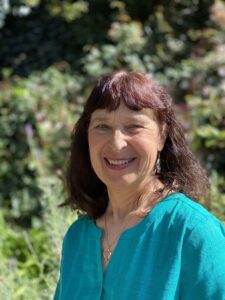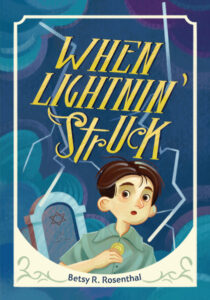I’m excited to share my interview with Betsy R. Rosenthal about her middle-grade novel WHEN LIGHTNIN’ STRUCK (Kar-Ben, 2022). I have known Betsy for many years, and it’s always a special treat to celebrate a friend’s new book.
WHEN LIGHTNIN’ STRUCK is a terrific historical novel about two unlikely friends in Odessa, Texas. In 1928, 11-year-old James is trying to sort out his family’s bad luck while he grieves the loss of his beloved grandmother. James befriends a Jewish boy named Paul, and the relationship helps him uncover a family secret. The story tackles some serious topics but is infused with a bit of humor and a lot of heart. Welcome, Betsy!
The setting of your story is Odessa, Texas. What inspired you to write a Jewish historical story based in Texas?
Once I knew that I wanted to follow the path of converso Jews who had left Spain and ultimately made their way to the U.S., I decided to choose Texas because most of them settled in the Southwest in this country. I specifically set my story in Odessa, Texas as a tribute to my ancestors who hailed from Odessa, Ukraine. And setting it in Odessa allowed me to incorporate the immigrant story of Paul’s family, having come from a place of the same name and with a similar topography.

James, your main character, has a very distinctive voice. He uses a lot of fun phrases that reflect the period and setting. His friend Paul is from Ukraine and English is not his first language. Did you need to do research to create these authentic voices?
Absolutely. Wanting to create the most authentic characters I could, I explored how non-American-born Russians speak English and the common language mistakes they make. And I hit the motherlode looking up Texas expressions from the 1920s. I found an abundant supply of outrageous and humorous options. Before and during my writing, I regularly research every aspect of the time and place of my stories. It’s a weakness—I can’t stop the researching. It was my favorite part of practicing law, and it just might be my favorite part of the writing process.
James has a special connection to his Abuela. Before her death, she gives him a charm that holds a secret about their family’s past. By the end of the story, James discovers he has more in common with his friend Paul than he realized. Can you share a bit about what you discovered about families like James’ while writing this story?
I read numerous books and articles about converso and crypto Jews, traveled to Girona, Spain and traipsed around the former Jewish call (community) there, and later made a trip to Albuquerque, New Mexico where our group was treated to lectures by scholars on this subject and by descendants of Spanish Jews who had converted centuries before. I learned about the small hints, including rituals and objects, that were passed along over the centuries from parents to their children, which led some of today’s descendants to learn of their Jewish heritage. Most of the current descendants of converso Jews were raised as Catholics and never understood the significance of some of these rituals. One example, which made its way into my book, was the act of playing card games on Friday nights. Converso Jews played cards at their table on Friday nights while holding their prayer books on their laps under the table and reciting the Shabbat prayers. This way anyone who passed by their house and happened to look in the window would see nothing but a family playing cards. Through my research I discovered more than I ever wanted to know about how dangerous it was for the Jews of Spain to continue engaging in any Jewish practices whatsoever. If they were exposed as “Judaizers” they would face gruesome, horrendous torture and likely be burned at the stake.

There are a lot of threads in When Lightnin’ Struck – bullying, anti-semitism, alcoholism, family secrets, as well as very specific historical details. Was it challenging to keep track of all the threads while you were writing?
The challenging part was giving voice to and describing the various characters to differentiate one from another. Also, I made a great effort to create three dimensional characters. Sometimes doing so was challenging for me, especially when it came to the bully, Virgil. I tried to allow his humanity to shine through. The other challenging part of this writing project was keeping the language consistent with the time in history the story took place, but simultaneously leaving out words and expressions that we find offensive or insensitive today.
What do you hope your readers come away with after reading When Lightnin’ Struck?
I very much hope that this story will give readers an appreciation for the melting pot that is this country and to become more sensitive to the prejudices, racism, anti-immigrant feelings, and anti-Semitism that continue to rear their ugly heads. Also, I hope that readers will learn from my book a bit about the tragic history of the Spanish Jews and how even in our time people in the Southwest U.S. are just now discovering that they are the descendants of Spanish Jews. Lastly, little did I know when I wrote this book how very timely it would be in 2022, the year that it was published, and the year that the country of Ukraine—the homeland of the immigrant family in my book—is under siege by Russia. Once again, as in the story of Paul’s family, people are fleeing Ukraine, seeking refuge from the violence and oppression of Russia. Unfortunately, the lesson here is that those who forget history, are doomed to repeat it.
Thanks, Betsy!
Betsy R. Rosenthal was a civil rights attorney before becoming an author. Her newest book for children is the middle grade historical fiction, When Lightnin’ Struck, a PJ OurWay selection. Her other children’s books include award-winning middle grade novel in verse, Looking for Me in this Great Big Family and the picture books—My House Is Singing, It’s Not Worth Making a Tzimmes Over!, Which Shoes Would You Choose?, An Ambush of Tigers, a wild gathering of collective nouns, and Porcupine’s Picnic, who eats what? Her essays have been widely published, her poems appear in anthologies, and she has also ghost-written books. She lives in Pacific Palisades, California, with her husband and two dogs. Her three adult children are making their way in the world. To learn more, visit her at www.BetsyRosenthal.com